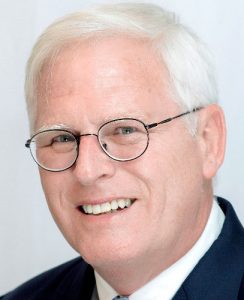Our role as leaders of congregations is most visible when we stand up to preach.
Whenever we step into the pulpit, we are “out in front” — thus fulfilling the shorthand definition of a leader. On any given Sunday, we strive to bring the truth of the gospel to bear on the lives of our people.
Quite often we speak to their grief, fear, despair and other needs. Other times, we ask questions without easy answers, thus inviting our people to reflect on where they are in their faith and what needs to change.
On still other occasions, we attempt to speak to specific issues facing the congregation: raising funds for a project, responding to a trauma in the larger community, painting a picture of the future of the church and mobilizing it to fulfill its mission.

Bill Ireland
Moreover, in these troubled times, we have a responsibility to speak to larger issues affecting our country. How do we help our people live as faithful disciples in the midst of a contentious and troubled culture? No matter the occasion, whenever we take to the pulpit, we are leading by preaching.
Learning to lead well through preaching is a lifelong task. Parts of this role may come easily to us. We may possess an innate “feel” for how to proceed. At other times, we may feel we’re in over our heads. The task is too big, and we are too small.
Given the fissures in our culture, bringing the gospel to bear on real world stuff is a daunting task, to say the least. We thus may step into the pulpit with dry mouths and sweaty hands. Putting ourselves out there is risky business.
Nevertheless, leading by preaching is not optional. Here are a few words of caution and encouragement.
Before we preach, let’s be sure the issue is one that truly matters to the congregation. Catching our listeners off-guard short-circuits our message. Instead of turning on the light, we leave our people in the dark. Why did she preach on that? Is there something going on? Where did that come from?
Although we have to raise awareness, springing an issue on our people without some advance preparation likely will result in confusion rather than clarity. Frustration will be the order of the day, and we will raise the level of anxiety instead of lowering it.
With regard to the above, we must be careful of those who seek to make their issues our issues. Just because someone is highly invested in a cause or project doesn’t mean I have to be in the same place. This is an instance where we have to keep the larger congregation in view.
The cause may indeed have merit. Nevertheless, we have to ask ourselves if our people are as aware or as passionate about this or that as its advocates. Let us remember that our pulpit is our pulpit, and we must follow the leading of the Spirit to set the agenda for our people.
Being truthful is also essential. This requirement should be obvious and go without saying. Sadly, however, we are living in a moment when truth is up for grabs. Pilate’s question to Jesus, “What is truth?” is the watchword of our day.
Too many imagine the truth is fungible and, as a result, many are liable to shop for the version of the “truth” that aligns with what they already think. Complicating matters is the hair-trigger response many offer when what we say doesn’t match up with what they believe.
“Since truth is in such short supply today, we must speak the truth as best we understand it from Scripture and to the best of our ability.”
As a result, Sunday’s sermon may lead to Monday’s griping and complaining. To avoid catching this kind of flak, we may be tempted to shade the truth to spare ourselves some grief and heartache. Since truth is in such short supply today, we must speak the truth as best we understand it from Scripture and to the best of our ability.
Some issues may spark righteous indignation and anger on our part. Seeing or learning of an injustice may inflame our passions and inspire us to speak. In such cases, we are right to be angry, but carrying all that anger into the pulpit can prove detrimental.
In this respect, putting Paul’s adage, “Be angry but do not sin” in our sermon preparation and delivery is a healthy guideline. After all, we want people to remember what we said, not how angry or passionate we were. We don’t want the sound of our thunder to drown out the gospel. Too much anger can sabotage the best of sermons.
Obviously, preaching on some topics is a “high risk” event. Speaking the truth as best we can to the issues of the day is not without consequence. Pushback is inevitable, and in some cases, we may find our jobs on the line.
We can expect some leaders within the church to advise us to cool it and move on to something else. This hard reality of congregational life suggests that if we know a sermon is going to generate some heat, we would be well served to have in place some opportunities for conversation, feedback and constructive criticism beforehand.
An open door makes for an open pulpit, one in which we can be free to speak the truth as best we understand it.
In light of the observations above, let us recognize we also lead by preaching when we’re willing to admit we were wrong. Despite our best efforts to get things right and speak the truth, we can and do fall short. A lack of information, a delayed recognition of our personal biases or an unconscious (or conscious) twisting of a text to serve our own ends — all these things and more can result in us reaching the wrong conclusion.
“We also lead by preaching when we’re willing to admit we were wrong.”
I recall an old John Wayne movie in which his character said, “Never apologize! It’s a sign of weakness!”
I disagree! When we get it wrong, the best thing we can say is: “I missed it. I spoke too soon. I said the wrong thing.” Being in front of a crowd and preaching a message that captures our hearers is a heady thing. Standing before our people and admitting we got off track won’t give us the same buzz. Such an act gives them yet another reason to trust us with the gospel and to keep listening.
Let me hem these suggestions with hope. Preaching in a worship service is the one time during the week when we have an opportunity to speak to the entire system. When we discharge our calling in thoughtful and generous ways, we open the doors for the Holy Spirit to take what we’ve said and what they’ve heard and turn it into life-changing gospel.
In the final analysis, this is likely the reason we got into this business in the first place. When we enter the pulpit and put ourselves out front, we are inviting our church to go with us as we seek God’s kingdom. When someone follows, that makes leading by preaching all the more worthwhile.
Bill Ireland is a former pastor who works as a certified leadership coach through Pinnacle Associates. He lives in Knoxville, Tenn.


